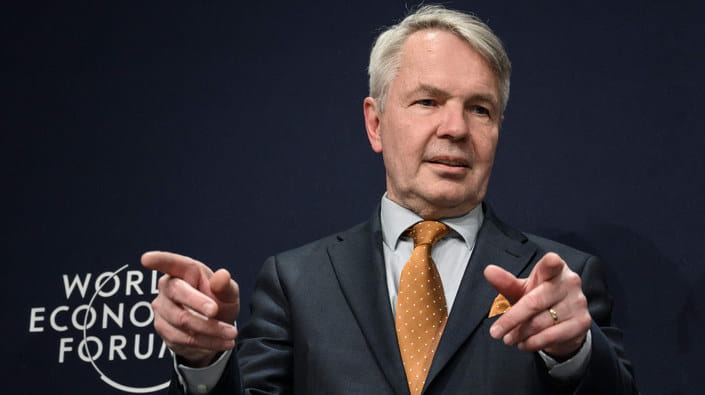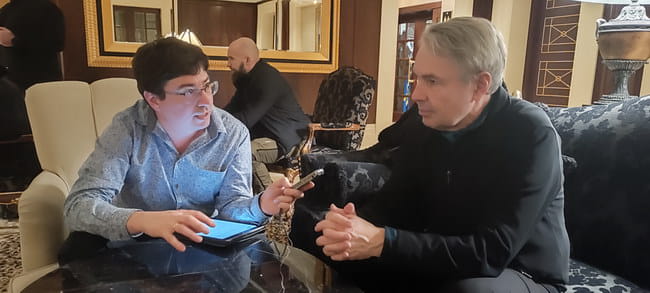"We Consider Nuclear Weapons While Frontline Reminds Us WWI"

Pekka Haavisto has been the Minister of Foreign Affairs of Finland since 2019. Based on his actions, we can safely call him a friend of Ukraine.
Finland, in general, is on the list of friendly to Ukraine countries. Many Finnish politicians have long supported Ukraine's European perspective and even advocated a visa-free regime...
The Finns remained way too conservative regarding one matter. It was security. Their own experience of the war with Russia (with the USSR back in those times) traumatised the Finns greatly. This remained history nowadays: Finland is standing on NATO's doorstep and will someday vote on Ukraine's NATO accession. However, the special attitude towards Russians in Helsinki still remained. But this is how reality looks in Europe.
Pekka Haavisto spoke with "European Pravda" on Monday during a joint visit to Kyiv of seven Nordic Foreign Ministers - Estonia, Finland, Iceland, Latvia, Lithuania, Norway, and Sweden.
"At first it was about nuclear weapons but now war becomes traditional"
- Mister Minister, what is the purpose of your visit to Kyiv?
- It has been very important for countries like Finland to support Ukraine against Russian aggression. We have delivered ten packages of military support and humanitarian aid. We have been welcoming more than 40,000 refugees from Ukraine.
I have met Mr. Kuleba several times in the European and NATO contexts. Now we are here for a ministerial meeting with the other Baltic Ministers. It was my duty to join this group. I have been previously to Kyiv. I have been to the contact line in Donbas before February 24. It was very important to show solidarity with your country.
- You have come as part of the biggest ministerial group since the full-scale invasion. What is the reason for this?
- We are a group of like-minded countries. We have historically very close Nordic cooperation. It's good to remember that we have Nordic countries inside NATO and outside NATO. Finland and Sweden joined NATO not so long ago. Some Nordic countries are outside the European Union, like Iceland and Norway. That doesn't influence our good cooperation. So we had good regional cooperation. We have also intensified our Baltic connection with Latvia, Lithuania, and Estonia. Estonia has been a close Finland partner for a long time. We are all together now in the framework of the Nordic-Baltic cooperation.
- What was your key message of this visit?
To show support and solidarity with Ukraine.
- Will Ukraine win?
- We are doing our utmost to support Ukraine. That includes military assistance, humanitarian aid, rebuilding support, and training of the Ukrainian arm forces.
- Russia is a nuclear state. Is it possible to win the war against a nuclear state?
- Looking back to history, there have been many wars that included a nuclear and a non-nuclear state. For instance, Vietnam and the US.
So, it is possible. It's not written in the stars that nuclear power always says the last word in the conflict.
In our case, the West, including several nuclear powers, and Russia are against each other in the war for the fate and freedom of Ukraine.
- Is escalation to nuclear war possible?
- As long as nuclear weapons exist, nuclear escalation is possible. Countries with nuclear doctrines should refrain from using nuclear materials and threatening with nuclear weapons. Escalation possibilities cannot be excluded, and one of the important duties of humanity is to try to avoid nuclear escalation. There are no winners in a situation with nuclear escalation in the war.
- Has the risk of a nuclear attack increased or decreased?
- At the beginning of this conflict, Russia used very loose nuclear rhetorical, sometimes referring to chemical weapons, not only nuclear weapons. Generally speaking about unconventional weapons, this is one of the reasons why Finland decided to make a new evaluation of its security situation.
There are many traditional threats that we can cope alone with. We have a strong military. We have a big reserve of 300,000 soldiers. If we are threatened with unconventional weapons, we need to work together against this kind of threat. NATO came as a very natural alternative for Finland under such circumstances.
- So, do you see threats of using non-conventional nuclear weapons?
- Threats remain, but with the passage of time, this war has become more traditional. At the very beginning, we spoke a lot about nuclear or chemical threats. We spoke about a hybrid or cyber threat. Then we look at the active war scenes, and they remind very much of WWII, sometimes even WWI. This has been a surprise to many. We run a conventional war with quite conventional methods.

- There is something that distinguishes the Russian aggression of 2022 from the Second World War – airstrikes. How can we stop them?
- Air defence or anti-rocket defence is becoming more and more crucial against rockets and all kinds of drones. The international community helps Ukraine with different kinds of air defence systems. We see new types of drones and rockets used against civilians.
Unfortunately, air defence systems do not hit 100% of targets, but it's getting better.
"The Finns are the only nation that did not stop building bomb shelters"
- Finland has changed its position greatly since February. On February 15, you personally said that Finland should not hand over weapons to Ukraine. You have already secured 10 military packages. What exactly was the turning point?
- Let's get it in order. First, when we were estimating the risk of Russian invasion, their military exercises on the borders with Ukraine, we asked ourselves if the chance of war was real or if it was only exercise.
We tried to use all possible sources of information, including the Ukrainian, the European, and the American side. It was all different. Talking with my Ukrainian counterparts, I had an impression that even Ukraine didn't believe this major attack on the capital could happen.
We had to also reassess the Russian goals in Ukraine compared with the long-term war in Donbas. And we saw clearly that Russia aimed to displace the Ukrainian government, to overthrow the government of the 40-million-strong country by force!
Quite soon after that, for the first time in our history, we discussed with the government if we should send military assistance to Ukraine. I called my Swedish and Norwegian colleagues, asking what they planned to do. They said they were also wondering whether they should back Ukraine militarily. Sweden answered that last time they supported anyone militarily was in 1939 when the Winter War started. They supported Finland by giving us arms.
And we decided that it was time to support Ukraine as well. You were brave enough to defend Kyiv against Russian attack.
Bucha happened after. We saw then terrible violations of human rights committed by Russia. But we had made the decision to back Ukraine with weapons earlier.
- It all led Finland to join NATO. However, the procedure is completed. Are you sure that Finland will eventually join NATO?
- The Finns are very security-oriented people. Someone said that we are the last country that still built bomb shelters everywhere after WWII. We have never stopped building bomb shelters. It should give you a picture of our security orientation. We ordered 64 new F35 fighters just last year when the world looked calm compared to now.
Since 2004, we have had a fixed principle in the so-called "white book" of our security: if the security environment changes, we are ready to consider the possibility of joining NATO. So, in February-March, we started a discussion about how much more the environment should change for us to join NATO. The debate in the parliament turned out to be very quick. We reached an agreement and aimed to convince Sweden to do the same. Fortunately, we did it together.
When exactly will we join NATO? Let's see.
Currently, there are two obstacles - Hungary and Turkey, which should ratify our accession agreement.
Hungary does not set any conditions. They have simply delayed the ratification. Turkey instead sets conditions on the policies of Finland and Sweden regarding our terrorism policies. We have already met twice in a tripartite format. The atmosphere of the meetings was good. However, the decision on the ratification is up to the Turkish leadership.
I am sure that we will become NATO members of NATO. Otherwise, NATO does not have the open door policy!
- You will definitely join NATO much sooner than Ukraine. Will Finland vote as a member state for Ukraine's NATO accession?
- We cannot give and or take any position now for obvious reasons.
As you know, we participate in NATO as observers. We have not been invited to two groups: nuclear safety and enlargement. Therefore, it would be better for diplomacy if I did not announce Finland's position on this matter. I can't do that.
"We are against the collective punishment of Russians"
- You can definitely give your opinion on EU matters. Will Ukraine join the EU soon?
- We are one of those countries which have supported Ukraine's EU accession for a long time. Just today, we have discussed with President Zelenskyy and Foreign Minister Kuleba how we could help Ukraine in the best possible way to fulfill all those criteria. The membership part is complicated, and it might be long. Therefore, we definitely support your future EU membership.
- Is it possible to happen in the current decade?
- Yes, it can happen in this decade.
Unfortunately, we have some unsuccessful stories on the Western Balkans where. Finland supported the membership of Albania and North Macedonia. North Macedonia has been delayed due to the name of the country. It was not even their fault. They had issues with Bulgaria. It has become a long process for these candidates. I hope the problem is solved now. If Albania and Macedonia join, it will also change the global situation with the EU enlargement.
- Who is guilty, Putin or Russians?
- It's a complex question. In one way, it's the leader responsible for the line of the country. If you live in an authoritarian country, then ordinary citizens can influence politics very, very little.
There are still people who can influence. And they should do it. That's why we were glad to hear voices like Alla Pugacheva or Yuriy Shevchuk from the rock scene who say they are against human rights violations.
- They are a small minority.
- Yes, they are. A very important minority.
- The majority supports the war. It was not Putin who committed murders and other crimes in Bucha, Izium, Kherson, etc. We sometimes see how Europeans tend to blame only Putin.
- According to the principles of the rule of law, we are against collective punishment. We always try to find the exact guilty people who committed the crime and the chain of command that shares responsibility. We cannot say that the nation, with all its representatives, is guilty of everything.
Interviewed by Sergiy Sydorenko,
"European Pravda" editor
